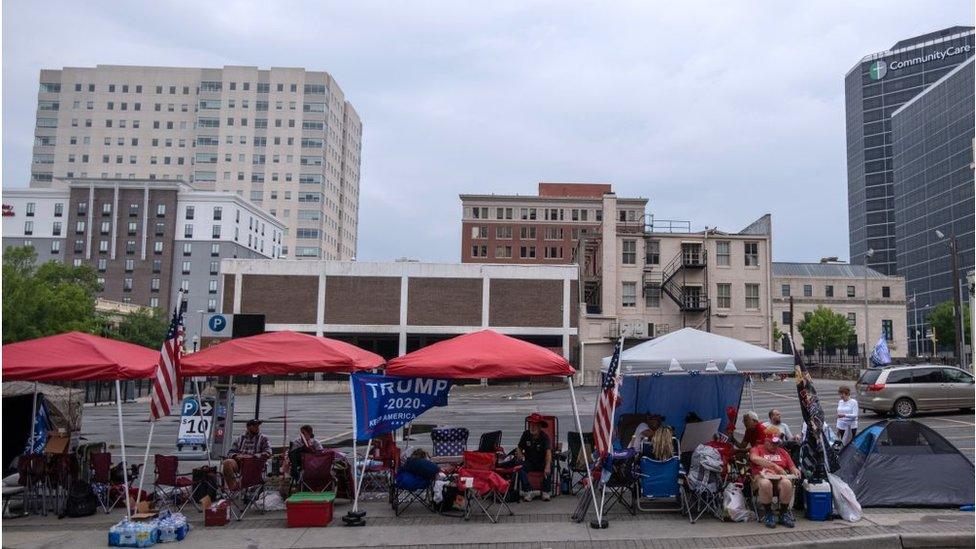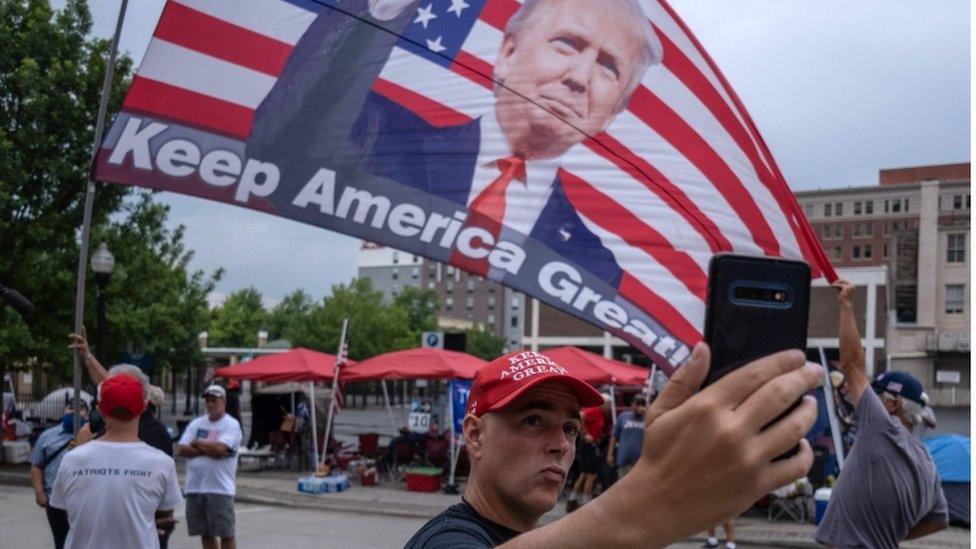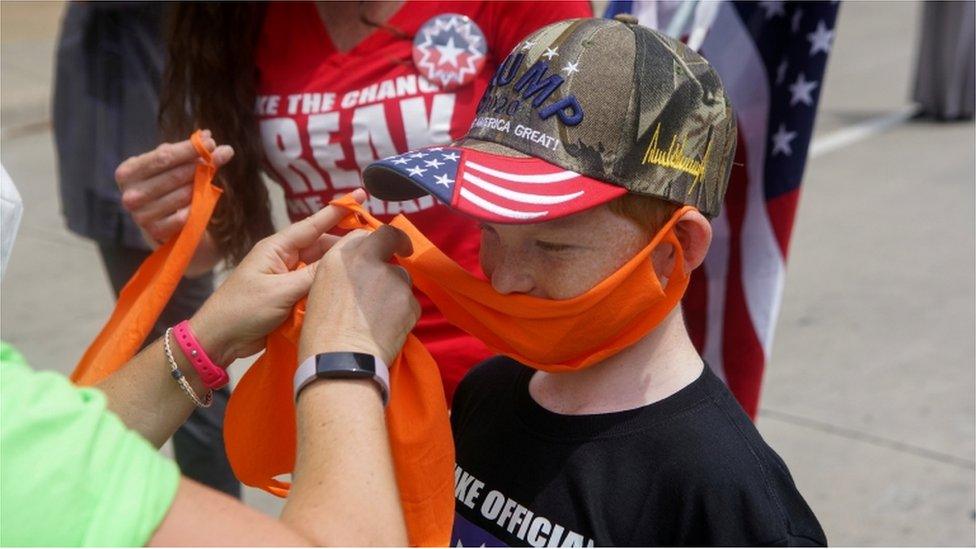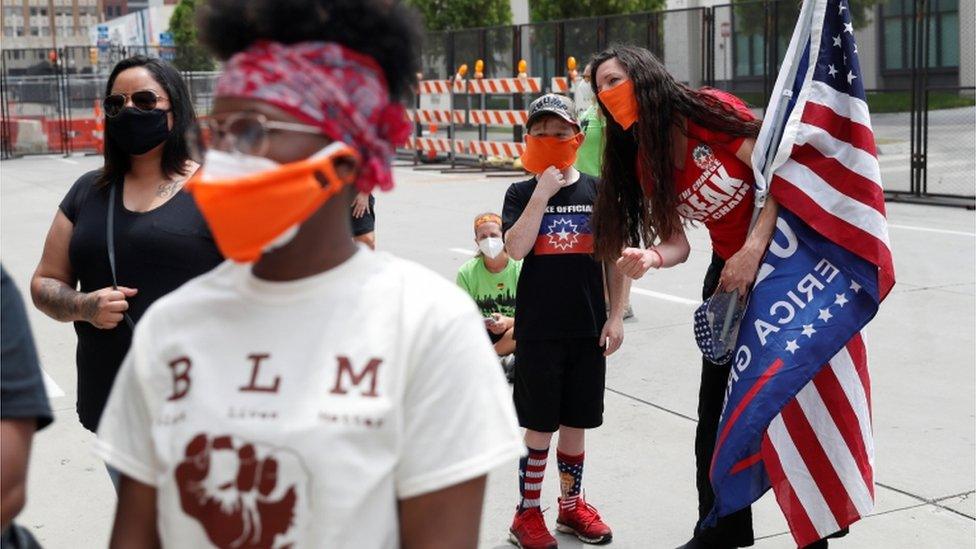Trump's Oklahoma rally can go ahead, court rules
- Published

Trump supporters have begun camping outside the arena
Oklahoma's Supreme Court has ruled that President Donald Trump's rally on Saturday in Tulsa, his first since March, can go ahead.
A lawsuit to stop the 20 June event over concerns that it could increase the spread of Covid-19 in the community was filed this week.
Virus cases are rising in Oklahoma, and local health officials have expressed concerns over hosting the rally.
The Trump campaign says they received over 1m ticket requests for the event.
The queue for the event at the Bank of Oklahoma Center - which seats 19,000 people - began forming earlier this week.

Facing tough re-election prospects in November, the Republican president is hoping to reboot his campaign after a rocky week that has seen news of sinking opinion poll numbers, twin US Supreme Court defeats, two damning tell-all memoirs and a resurgence in coronavirus cases.
The lawsuit to cancel his rally was filed by John Hope Franklin for Reconciliation, a nonprofit organisation that promotes racial equality, and a commercial real estate company, the Greenwood Centre.
They argued the venue should mandate social distancing guidelines in accordance with US public health officials' recommendations, or cancel the event.
But the Supreme Court said that as the state had begun to reopen, the regulations left social distancing decisions up to individual business owners. Oklahoma has seen a recent spike in coronavirus cases.
In response to safety concerns, the Trump campaign has said they will check attendees' temperatures and offer hand sanitiser and masks.
But people buying tickets for the Tulsa rally online also have to click on a waiver confirming they "voluntarily assume all risks related to exposure to Covid-19" and will not hold the president's campaign responsible for "any illness or injury".

Some of the president's supporters gathering in Tulsa have been seen wearing masks
The president himself has pushed back against guidance around masks, calling them a personal choice.
In an interview with political news outlet Axios released on Friday night, he was asked if he recommended rally attendees wear facial coverings.
"I recommend people do what they want," he replied.
Mr Trump also said: "We're going to have a wild evening tomorrow night at Oklahoma."
White House Press Secretary Kayleigh McEnany has said attendees will be given masks, but they will not be instructed to wear them - and told reporters on Friday that she will not be wearing one either.
Tulsa's health department director Dr Bruce Dart told the Tulsa World paper, external: "I wish we could postpone this to a time when the virus isn't as large a concern as it is today."
Tulsa's mayor imposed a curfew on Thursday around the venue, declaring a civil emergency, but the president says the city leader has assured him the measure will not apply to the rally itself.
Mayor GT Bynum, a Republican, cited recent "civil unrest" and potential opposition protests as he slapped an exclusion zone on a six-block radius near the arena.
But on Friday afternoon, Mr Bynum said that the Secret Service had asked the city to lift the curfew.
"Last night, I enacted a curfew at the request of Tulsa Police Chief Wendell Franklin, following consultation with the United States Secret Service based on intelligence they had received," the mayor said in a statement.
"Today, we were told the curfew is no longer necessary so I am rescinding it."
The mayor also said law enforcement had intelligence that "individuals from organised groups who have been involved in destructive and violent behaviour in other states are planning to travel to the city of Tulsa for purposes of causing unrest in and around the rally".
Meanwhile, a high metal fence was put up to barricade the Trump rally venue.
Earlier on Friday, President Trump posted a warning on Twitter to demonstrators.
"Any protesters, anarchists, agitators, looters or lowlifes who are going to Oklahoma please understand, you will not be treated like you have been in New York, Seattle, or Minneapolis," the president tweeted.
"It will be a much different scene!"

Trump supporters watch a Juneteenth event in Tulsa
Mr Trump originally planned to hold the rally on Friday, but changed the date last week after learning it fell on Juneteenth, the celebration of the end of US slavery.
The president told the Wall Street Journal on Thursday that a black Secret Service agent had told him the meaning of the anniversary.
On Friday, Ms McEnany said the president "routinely commemorated" the day and "he did not just learn about Juneteenth this week".
Tulsa was the site of one of the worst racial massacres in US history.
'A celebration of life. A celebration of freedom': What you need to know about Juneteenth